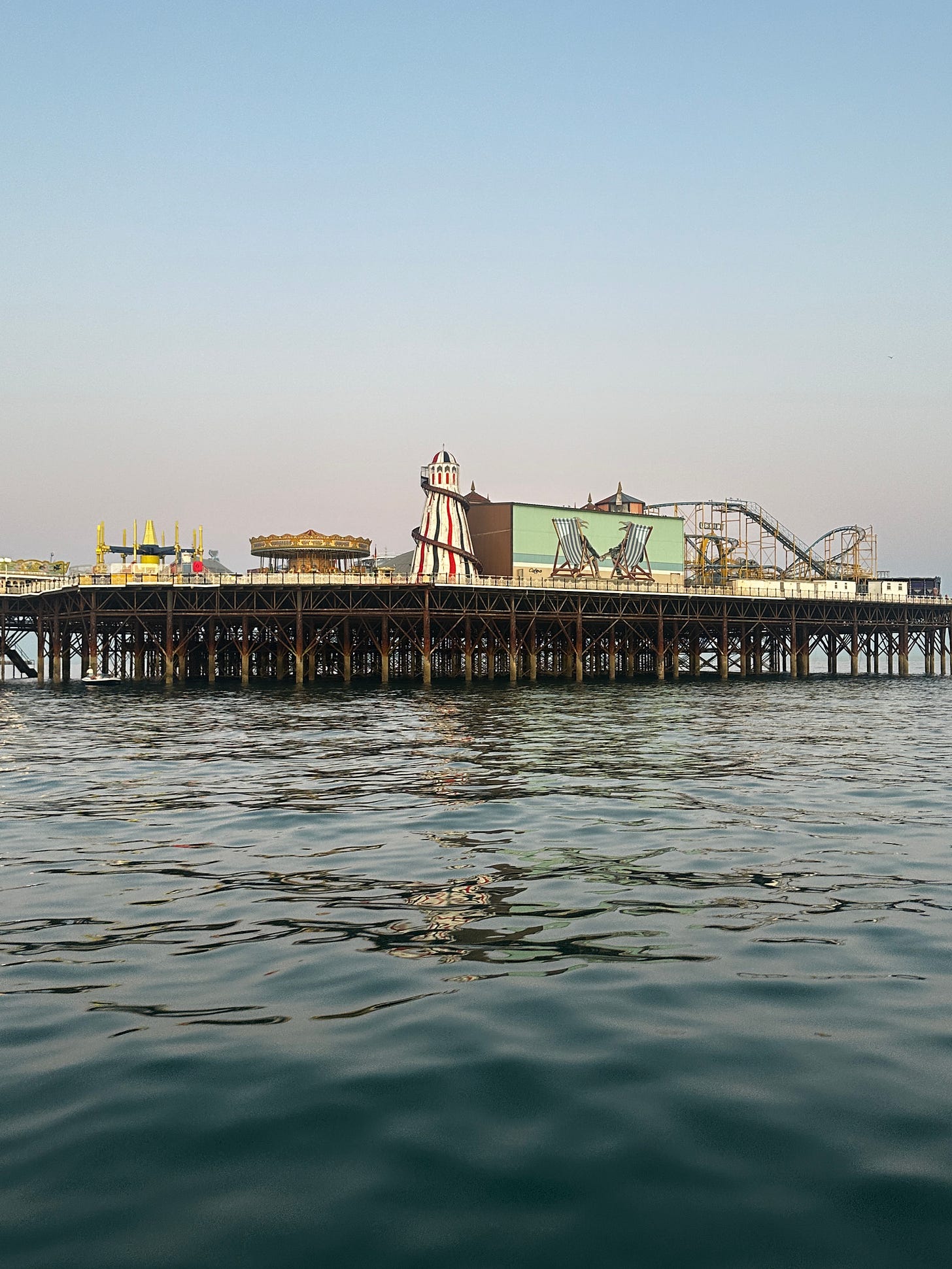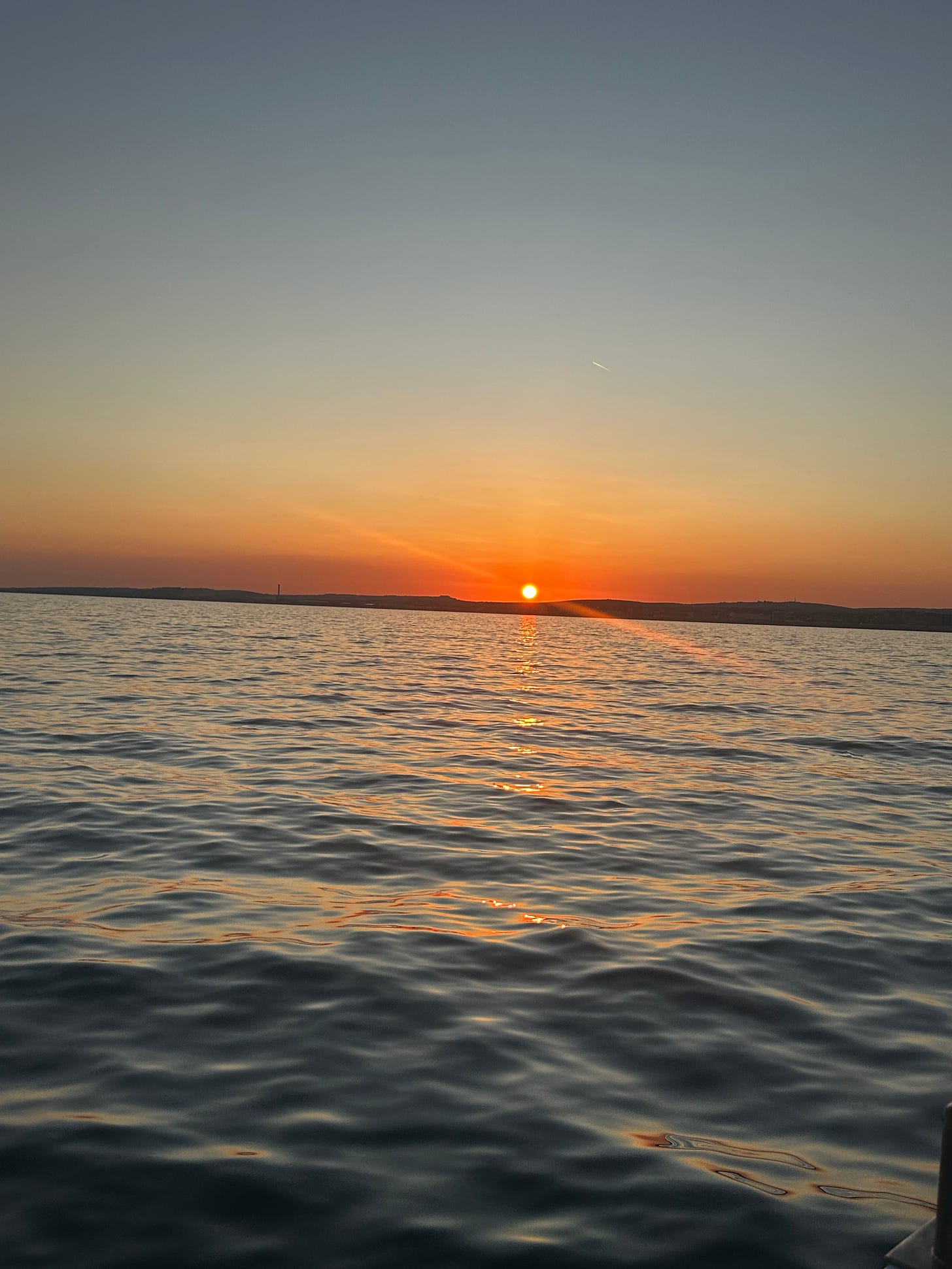Kind of Wild is a weekly newsletter on trying to live ethically while still enjoying life. I am a 40-something published author, podcaster, public speaker, charity PR specialist and writer. I speak four languages and live in Brighton, UK. I’ve been vegan for over a decade. I want to save the world - but I also want to experience it.
Sunshine, heatwaves and lots of Brighton adventures: this summer is shaping up to be one of the most amazing ones in recent memory. When compiling this season’s highlight reel, one moment that immediately comes to mind is the sunset boat trip I recently went on with the Sussex Dolphin Project.
When I found out about the Sussex Dolphin Project, I felt instantly interested in the work they do. For starters, I had no idea we even had dolphins in Sussex - so I was quite intrigued upon finding out that actually we have four types of cetaceans in the Sussex area. The Sussex Dolphin Project works to educate the public about these animals, researching their population and behaviours to identify habitats, and provide evidence for the need for their protection. As soon as I learned that this fantastic organisation organises boat trips around Brighton, I knew I had to book.
Now, spoiler alert: at no point during this post will I mention having actually seen any dolphins. I have not, but I hope that one day I will. Sussex Dolphin Project, like any truly ethical organisation in this field, makes it clear that coming on their trips does not guarantee any dolphin sightings. As I said here, places that promise interactions or sightings of animals are almost always guaranteed to be unethical. More on this below.
I don't want to brag, but I did get the timing for our Sunset Cruise perfectly right. It was a Friday evening and 23 degrees Celsius at sunset. The sea was calm. Everywhere I looked, postcard-worthy views lay before my eyes. Never had there been a more fantastic evening for a boat trip. We went aboard the ship in Brighton Marina and our lovely volunteer explained all about the Project’s work while the boat smoothly sailed out of the marina.
Seeing Brighton from this angle - the piers, the sun setting over the sparkling water, and then after a while the city twinkling as dusk fell - was magical. Listening to the volunteer tell us all about the different cetaceans who call Sussex home also made me feel like I knew my city a little bit better.
When I was a child, I wanted to be a dolphin trainer. It wasn’t until I learned more about animal rights that I realised that if you loved dolphins, that is the worst possible job you could want. Captivity is incredibly cruel to these marine animals - had I known then what I know today, I would without a doubt have wanted to work somewhere like the Sussex Dolphin Project instead.
The Sussex Dolphin Project’s current campaigns include raising awareness of supertrawlers - giant factory fishing trawlers that often result in dolphins dying as “bycatch”. The Dolphins Aren’t Discard campaign aims to end dolphin deaths in supertrawler nets by calling for bycatch to be reported and for the government to implement more accurate monitoring - remote electronic monitoring should be a required condition for all fishing vessels over 95m operating in the UK’s Exclusive Economic Zone. While this is crucial work, it’s important to keep in mind that we can all help end bycatch just by leaving fish off our plates.
The Sussex Dolphin Project also works with education by visiting schools, and as someone who guest-lectures at universities, I know just how vital the work of opening eyes and changing young minds is.
A word with Thea Taylor, the Managing Director of the Sussex Dolphin Project
I decided to go straight to the source and talk to the team themselves to find out more about the work the Sussex Dolphin Project does. I talked to Managing Director Thea Taylor, who’s quickly becoming one of my heroes. A marine biologist who has volunteered with marine animals everywhere from Scotland to the Falkland Islands, she is passionate about ecosystem-level restoration aimed at protecting target species - but she also loves encouraging locals to connect with their coastline.
Thea, tell us a bit about the boat trips Sussex Dolphin Project arranges, like the one I went on?
Our ecotourism cruises such as the sunset wildlife cruise are an opportunity to educate members of the public in the environment we are trying to protect. The majority of our guests do not know about the work of the Sussex Dolphin Project and join the trips simply as a fun thing to do. We hope that they leave the experiences with a better knowledge of local marine life, and be inspired to take actions to protect the incredible animals we teach them about.
What threats are marine animals facing in this part of the world?
Dolphins and other marine mammals face a huge variety of threats in the Eastern English channel in particular. The area of water off the Sussex coast is heavily fished, and bycatch (accidental catch of non-target species in fishing gear) is still sadly the leading cause of death for cetaceans around the UK. Fishing also poses other challenges for our marine mammals in that industrial fishing removes huge quantities of fish that would otherwise contribute to the marine food web, removing valuable food resources and creating increasing conflict between species. We are already seeing interactions between bottlenose dolphins and harbour porpoise that may be the result of resource competition.
Aside from fishing, the Sussex coastline is incredibly busy with recreational boat traffic, particularly around Brighton and Eastbourne. Disturbance from recreational vessels can impact the behaviour of dolphins and porpoises, from interrupting socialisation - an important activity in the lives of dolphins that rely heavily on social bonds to hunt, to disrupting feeding.
Wow. I know that upon learning all of that, I’d be motivated to do something. How can people engage with your work?
Members of the public can get involved in two main ways. Firstly, you can come out on our boat trips! These run all through the summer months and are a fantastic way to learn all about the amazing marine life off the coast, while supporting our work.
You can also sign up for one of our landwatch training sessions. These take place throughout the year and are a great way for people to learn about the research we do, and help to actively contribute data to our database. All data collected by our landwatch volunteers helps to increase our knowledge of the marine mammals off the Sussex coast, and ultimately lead towards their protection.
How can people get active for marine life overall?
The main thing we say when people ask how they can help dolphins, is to stop eating fish. It is a little bit of a no-brainer when it comes to dolphin protection! If people can't or won't stop eating fish (it's amazing how often we get this response), then we recommend that they only eat fish from local fishmongers using sustainable methods from small boat fishers.
Additionally: be responsible with the products used in the household, everything that goes down the drain eventually ends up in the ocean and chemical pollution is a big issue. And limit your plastic usage where possible. We all understand that unfortunately plastic is pretty unavoidable in life these days, but reduce where possible, recycle and be responsible for your waste!
Got that - I’ll certainly be looking for a more eco-friendly cleaning product. What should people do if they encounter dolphins or other marine mammals in nature?
If you are lucky enough to encounter marine mammals in the wild, just remember that these are wild animals! It is not their job to entertain you, so if they are ignoring you, keep your distance. It is illegal to disturb marine mammals by approaching within 100m, but we understand that bow riding dolphins often have ideas of their own! If they do approach you, stay at a consistent speed and, most importantly, stay in a straight line. Most injuries to dolphins happen when vessels change speed or direction suddenly, and the last thing anyone wants from an encounter is to injure an animal.
Do not try to touch or feed the animals, and please do not chase them if they move away. Most importantly, enjoy the encounter, and if the dolphins are off Sussex, Kent or Hampshire, please tell us about it! You can find our guidelines on our website.
As a very happy customer, I’d love to encourage everyone in the Sussex area to join the Project’s trips. I had a beautiful time and learned so, so much. I’d love to be involved with cetacean protection in other ways too - stay tuned, more updates possibly to come.
Important note: this trip was NOT gifted or sponsored. I was a paying customer who just really enjoyed the experience.








